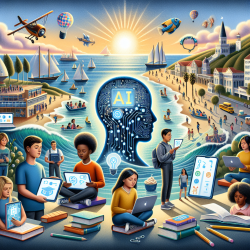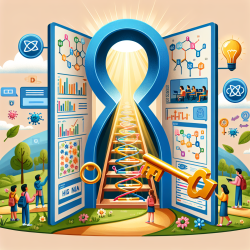Introduction
Artificial Intelligence (AI) is reshaping the educational landscape, offering innovative ways to enhance learning and teaching. In California, the integration of AI into K-12 education is gaining momentum, driven by the California Department of Education (CDE) and its AI Resource Kit. This initiative aims to support educators in navigating the complexities of AI, ensuring that students are equipped with the skills necessary to thrive in an AI-driven world.
Learning With AI, Learning About AI
AI offers exciting learning opportunities by personalizing education and increasing accessibility. However, it also raises important considerations regarding data privacy and ethical use. The CDE emphasizes the importance of human relationships in education, especially when incorporating AI tools like ChatGPT. This is crucial given the isolation experienced during the COVID-19 pandemic, highlighting the irreplaceable value of a caring educator.
Resources and Professional Learning
The CDE is committed to providing resources and professional learning opportunities to educators. The AI webinar series, "Artificial Intelligence: Learning with AI, Learning about AI," features insights from educators and industry professionals, focusing on actionable resources for schools. Additionally, the TeachAI project collaborates with organizations like Code.org and Khan Academy to empower educators in teaching AI.
Where is AI in the World of Today and Tomorrow?
AI is an integral part of our daily lives, from virtual assistants to social media algorithms. Understanding AI's role and potential risks is essential for educators and students. The World Economic Forum predicts that 1.1 billion jobs will be transformed in the next decade, highlighting the importance of AI literacy in preparing students for future careers.
Utilizing AI in Schools
AI can enhance educational experiences by automating administrative tasks, personalizing learning, and supporting students with disabilities. However, it's crucial to address ethical considerations, data privacy, and algorithmic bias. Educators are encouraged to develop ethical use guidelines with students, fostering a responsible digital learning environment.
Developing AI in Schools
Empowering students to engage with AI as creators, not just users, is vital. Integrating AI education with computer science standards promotes diversity and inclusion, addressing systemic biases in STEM fields. By fostering student voice and problem-solving skills, we prepare them to tackle real-world challenges with AI.
Conclusion
The integration of AI into California's education system presents immense opportunities for innovation and personalized learning. By equipping educators and students with the knowledge and skills to engage with AI responsibly, we can harness its potential while safeguarding individual privacy and security. For more information, please follow this link.










